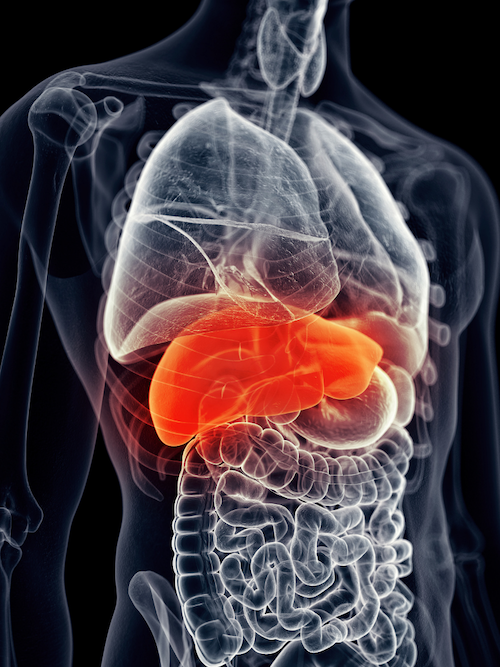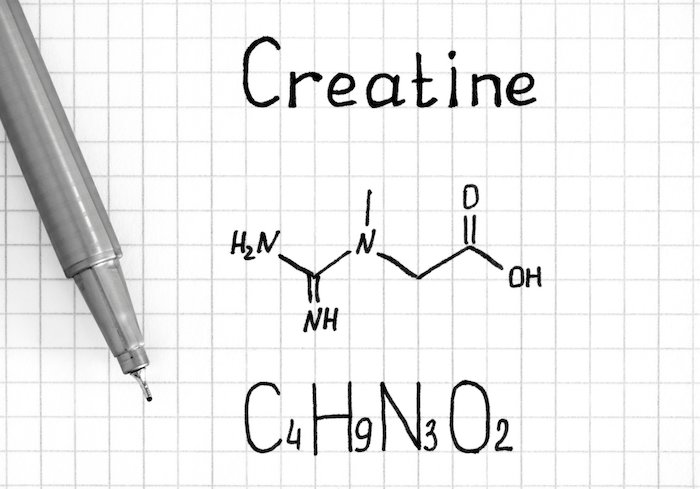What Is Creatine?

When it comes to sports performance supplements, creatine is number one. But even though plenty of research exists on the use of creatine, some still choose to avoid it. This is due to purported side effects that range from dehydration to impacting liver function.
In today’s blog, we’ll go over the research surrounding creatine.
But first, let’s cover some of the basics.
What is creatine?
Creatine is found naturally in your body, primarily stored in your muscles. [1]
You can get it directly from meat and fish, or your body can produce it from amino acids. However, diet alone can’t usually maximize the amount of creatine stored in your body. But supplements help.
So, why would someone want to supplement creatine?
During high-intensity exercise, the creatine stored in your body helps your muscles produce more energy. As such, additional creatine enhances exercise performance. [2]
And once creatine stores within your muscles are maximized, any excess is broken down into creatinine, then metabolized by your liver and peed out. [3]
Purported side effects
As mentioned above, some people avoid creatine use out of concern for a few side effects. These include:
- Kidney damage
- Liver damage
- Kidney stones
- Weight gain
- Dehydration
- Cramps
- Digestive issues
Of course, after reading that list, you’re thinking that maybe you’ll forget about ever adding creatine to your pre-workout shake.
But before you banish it forever, let us go over the research surrounding these apparent side effects. You may realize that they’re actually more myth than fact.
Because despite these claims, the International Society of Sports Nutrition regards creatine as “extremely safe”, even going as far to say that it’s one of the most beneficial sports supplements out there. [4]
Additionally, leading researchers on the matter – with decades of creatine research under their belt – have concluded that it’s very safe. [5]
One study monitored 52 health markers in participants taking creatine supplements for 21 months, finding no adverse effects. [5]
In fact, creatine has actually been used to treat various health issues, including neuromuscular disorders, concussions, diabetes, and muscle loss. [4, 6, 7, 8]
All of this is pretty reassuring. But what about the specific purported side effects? Is there research refuting those claims? The answer is yes! Let’s dive in.
Does creatine cause dehydration or cramps?
Because creatine sends additional water into your muscles, a theory developed that it must be dehydrating you. But this shift in water is minor and no research supports the idea that creatine use leads to dehydration.
Let’s take a look at some of that research.
A study which spanned three years and involved college athletes found that those who took creatine actually had fewer cases of dehydration, muscle cramps, or muscle injuries than those not taking the supplement. They also missed fewer sessions due to illness or injury. [9]
Another study looked at creatine use during exercise in hot weather, an activity that can accelerate cramping and dehydration. However, during a 35-minute cycling session in high heat – compared to a placebo – creatine had no adverse effects. Blood tests confirmed no difference in hydration or electrolyte levels. [10]
Interestingly, patients undergoing hemodialysis – a medical treatment that may cause muscle cramps – experienced 60% fewer incidence of cramps when supplementing creatine. [11]
Judging by these studies, not only does creatine not cause dehydration or cramping, it may actually protect against these. If you‘re still worried about creatine displacing the water in your body, but you wanted to try the supplement, just be sure to drink some extra water!
Does creatine cause weight gain?
Research has shown that creatine supplements do in fact cause an increase in weight gain. After just one week of high daily doses of creatine, your weight will increase by about 2-6 pounds. However, this is due to increased water in your muscles, not an increase in fat. [12]
Long term, studies show that body weight may continue to increase to a greater extent in those using creatine. But again, this is because of muscle growth. [13]
For athletes, the growth in muscle is a positive which can improve performance. It’s actually one of the main reasons many take creatine, and as such shouldn’t really be considered a side effect. [14]
On top of that, increased muscle can have benefits for many people, including older adults, obese individuals, and those with certain health conditions. [15, 16, 17, 18, 19]
How does creatine affect your liver and kidneys?
When your body breaks down excess creatine, levels of creatinine can be raised in your blood. Because creatinine is commonly used to diagnose liver or kidney problems, theories arose that creatine negatively impacts the liver and/or kidney.
However, elevated creatinine levels alone does not mean that these organs are being harmed. [20]
Multiple studies have been done to evaluate how creatine affects the liver and kidney, and to date, there is no evidence to support the notion that creatine harms the liver or kidneys. [21, 22, 23, 24, 25]
A long term study of college students taking creatine found no side effects related to the function of the liver or kidney. And a similar four year study concluded the same thing. [26, 23]
You may have heard of one case involving a weightlifter who was diagnosed with kidney disease. It’s heavily reported that this individual supplemented creatine, however numerous other factors – including lifestyle habits, genetics, and other supplements – likely played a role. [27]
If you’d like to try creatine and you’re still worried about how it may impact your kidneys or liver, talk to your doctor about your specific condition and how it may affect your health.
Does creatine cause digestive problems?
Just like with many supplements or medications, high doses may cause digestive problems.
One study observed no digestive issues with the recommended 5-gram dose, while doubling it to a 10-gram dose increased diarrhea risk by 37%. For this reason, it’s best to follow the recommended serving, which is typically between 3-5 grams. [28]
A leading researcher on the topic reviewed several studies, finding that – when taken at the recommended dose – creatine does not increase digestive issues. [29]
That being said, it depends on the product you use. Some additives, ingredients, or even contaminants may interact with digestion, having a negative effect.
Does creatine interact with other drugs?
That being said, creatine itself may interact with certain medications. If you’re taking any medications, you should discuss potential reactions with your doctor.
Medications that may interact with creatine include cyclosporine, aminoglycosides, gentamicin, tobramycin, anti-inflammatory drugs like ibuprofen, and numerous others. [30]
If you’re taking any medications that affect liver or kidney function, blood sugar, or if you’re pregnant, breastfeeding, or have a health condition, be sure to discuss creatine with your doctor, if you’re interested.
So, is creatine safe?
Similar to any supplement that isn’t a simple vitamin or common nutrient (like a mineral), whether or not you should take it depends on you.
If you’re by all accounts healthy and looking to build muscle, the research indicates that taking the recommended daily serving should be well tolerated. 
If you’re looking for a more subtle way to enhance the strength of your muscles using a supplement that you not only don’t have to worry about…
But you actually NEED for your overall health…
Then you’re looking for vitamin D.
That’s right! Research has found that those with higher vitamin D levels also have stronger muscles!














